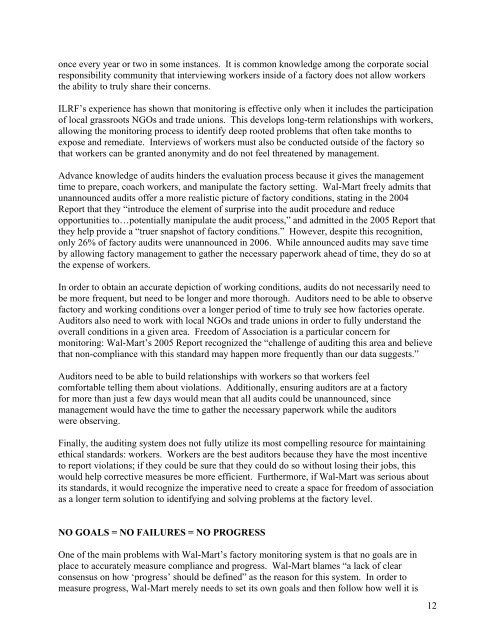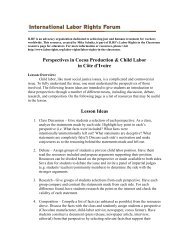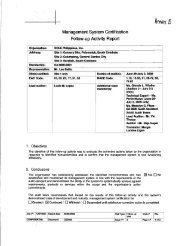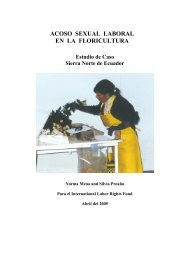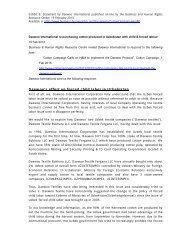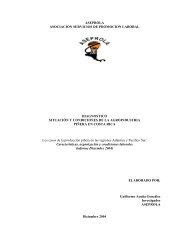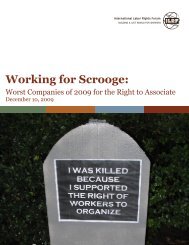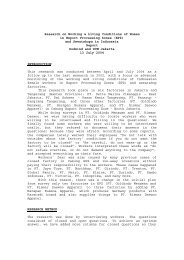Ethical Standards and Working Conditions in Wal-Mart's Supply Chain
Ethical Standards and Working Conditions in Wal-Mart's Supply Chain
Ethical Standards and Working Conditions in Wal-Mart's Supply Chain
Create successful ePaper yourself
Turn your PDF publications into a flip-book with our unique Google optimized e-Paper software.
once every year or two <strong>in</strong> some <strong>in</strong>stances. It is common knowledge among the corporate socialresponsibility community that <strong>in</strong>terview<strong>in</strong>g workers <strong>in</strong>side of a factory does not allow workersthe ability to truly share their concerns.ILRF’s experience has shown that monitor<strong>in</strong>g is effective only when it <strong>in</strong>cludes the participationof local grassroots NGOs <strong>and</strong> trade unions. This develops long-term relationships with workers,allow<strong>in</strong>g the monitor<strong>in</strong>g process to identify deep rooted problems that often take months toexpose <strong>and</strong> remediate. Interviews of workers must also be conducted outside of the factory sothat workers can be granted anonymity <strong>and</strong> do not feel threatened by management.Advance knowledge of audits h<strong>in</strong>ders the evaluation process because it gives the managementtime to prepare, coach workers, <strong>and</strong> manipulate the factory sett<strong>in</strong>g. <strong>Wal</strong>-Mart freely admits thatunannounced audits offer a more realistic picture of factory conditions, stat<strong>in</strong>g <strong>in</strong> the 2004Report that they “<strong>in</strong>troduce the element of surprise <strong>in</strong>to the audit procedure <strong>and</strong> reduceopportunities to…potentially manipulate the audit process,” <strong>and</strong> admitted <strong>in</strong> the 2005 Report thatthey help provide a “truer snapshot of factory conditions.” However, despite this recognition,only 26% of factory audits were unannounced <strong>in</strong> 2006. While announced audits may save timeby allow<strong>in</strong>g factory management to gather the necessary paperwork ahead of time, they do so atthe expense of workers.In order to obta<strong>in</strong> an accurate depiction of work<strong>in</strong>g conditions, audits do not necessarily need tobe more frequent, but need to be longer <strong>and</strong> more thorough. Auditors need to be able to observefactory <strong>and</strong> work<strong>in</strong>g conditions over a longer period of time to truly see how factories operate.Auditors also need to work with local NGOs <strong>and</strong> trade unions <strong>in</strong> order to fully underst<strong>and</strong> theoverall conditions <strong>in</strong> a given area. Freedom of Association is a particular concern formonitor<strong>in</strong>g: <strong>Wal</strong>-Mart’s 2005 Report recognized the “challenge of audit<strong>in</strong>g this area <strong>and</strong> believethat non-compliance with this st<strong>and</strong>ard may happen more frequently than our data suggests.”Auditors need to be able to build relationships with workers so that workers feelcomfortable tell<strong>in</strong>g them about violations. Additionally, ensur<strong>in</strong>g auditors are at a factoryfor more than just a few days would mean that all audits could be unannounced, s<strong>in</strong>cemanagement would have the time to gather the necessary paperwork while the auditorswere observ<strong>in</strong>g.F<strong>in</strong>ally, the audit<strong>in</strong>g system does not fully utilize its most compell<strong>in</strong>g resource for ma<strong>in</strong>ta<strong>in</strong><strong>in</strong>gethical st<strong>and</strong>ards: workers. Workers are the best auditors because they have the most <strong>in</strong>centiveto report violations; if they could be sure that they could do so without los<strong>in</strong>g their jobs, thiswould help corrective measures be more efficient. Furthermore, if <strong>Wal</strong>-Mart was serious aboutits st<strong>and</strong>ards, it would recognize the imperative need to create a space for freedom of associationas a longer term solution to identify<strong>in</strong>g <strong>and</strong> solv<strong>in</strong>g problems at the factory level.NO GOALS = NO FAILURES = NO PROGRESSOne of the ma<strong>in</strong> problems with <strong>Wal</strong>-Mart’s factory monitor<strong>in</strong>g system is that no goals are <strong>in</strong>place to accurately measure compliance <strong>and</strong> progress. <strong>Wal</strong>-Mart blames “a lack of clearconsensus on how ‘progress’ should be def<strong>in</strong>ed” as the reason for this system. In order tomeasure progress, <strong>Wal</strong>-Mart merely needs to set its own goals <strong>and</strong> then follow how well it is12


